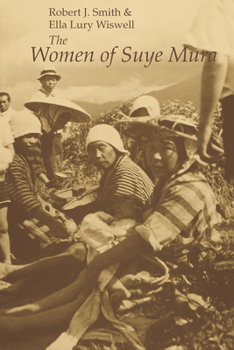The Women of Suye Mura
Select Format
Select Condition 
Book Overview
Japanese women are frequently perceived by foreigners as stereotypes. Pictured as compliant, long-suffering, and charming in a childlike way, they are said to be child-centered and restricted in their interests and actions to the domestic realm. The appear as victim, pawn, or tragic heroine: Madame Chrysanthemum, Madame Butterfly, and even the impossible Mariko of Shogun . The Women of Suye Mura provides a rich body of information by means of which such stereotypes may be reevaluated and challenged. Based on Ella Wiswell's extensive field notes from the mid-1930s-when she and her late husband John Embree undertook a joint research project in rural Japan-this volume forms a companion to Embree's now-standard Suye Mura: A Japanese Village . Its focus on the women of the village affords a unique look at their daily lives and a detailed portrait of their world-views and social understandings at a time when the orthodoxies of the contemporary state were not yet completely accepted. Through Ella Wiswell's journal, sensitively edited by Robert Smith, we may understand some of their hopes and fears, see what amuses and angers them, and hear their comments on everything from adultery and illness to religion, magic and the origins of the imperial house. The body of data, secured by direct observation, is unparalleled in the literature. No other account of the lives of Japanese rural women of this era remains, and in no contemporary community can their like be found. The Women of Suye Mura will thus serve as an important resource for anyone interested in the past-and present-of the Japanese woman.
Format:Paperback
Language:English
ISBN:0226763455
ISBN13:9780226763453
Release Date:November 1982
Publisher:University of Chicago Press
Length:348 Pages
Weight:1.12 lbs.
Dimensions:0.8" x 6.0" x 9.0"
Customer Reviews
1 rating
A village full of independent Pre-war Rural Japanese women
Published by Thriftbooks.com User , 22 years ago
This is a wonderful book although it was stiched together by Smith almost 50 years after Wiswell created the raw material in her journal notes--because it simply has no competition. Ella Wiswell was John Embree's wife and co-ethnographer in Suye Mura in 1935-36. She returned to her original calling as a Professor of European languages after his death in 1951, just filing her notes and journals away until Smith came along and talked her into opening them up. This volume reveals a pre-war rural Japan of gossipy, lusty, and surprisinglyly independent women; flexible families, gobs of divorce and remarriage (initiated by women as well as men), independent and defiant youths of both sexes. It goes a good deal further than Embree's original monograph to make the ability of Japan to industrialize as early as it did understandable. These are not strong Confucian or samurai families extending from the past above to the future below, but horizontal families with sometimes comically permeable boundaries--weak families in the demands that can effectively be made on members, weak in their ability to retain even central members (like wives or husbands). And where family is weak, individuals are able to shine--and these people do.






